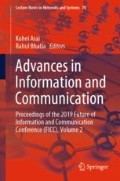Abstract
In this paper, we propose Korean-optimized word representations that can better address the out-of-vocabulary (OOV) problem caused by misspelling. This problem is an important issue in many applications based on natural language processing. However, previous models do not fully consider the representations of misspelled OOV words. To overcome this problem, we propose sub-character information obtained from Korean Jamo units and also adopt additional sub-character information to better withstand the misspelling. Finally, experimental results show that our model is about 2.3 times more accurate than the conventional model in case of the misspelled word while still maintaining the semantic relationship of the words.
Access this chapter
Tax calculation will be finalised at checkout
Purchases are for personal use only
References
Mikolov, T., Chen, K., Corrado, G., Dean, J.: Efficient estimation of word representations in vector space, arXiv preprint arXiv:1301.3781 (2013)
Pennington, J., Socher, R., Manning, C.: Glove: global vectors for word representation. In: Proceedings of the 2014 Conference on Empirical Methods in Natural Language Processing (EMNLP), pp. 1532–1543 (2014)
Sienčnik, S.K.: Adapting word2vec to named entity recognition. In: Proceedings of the 20th Nordic Conference of Computational Linguistics, Nodalida 2015, May 11–13, 2015, Vilnius, Lithuania, pp. 239–243. Linköping University Electronic Press (2015)
Hu, M., Peng, Y., Qiu, X.: Reinforced mnemonic reader for machine comprehension. CoRR, abs/1705.02798 (2017)
Wieting, J., Bansal, M., Gimpel, K., Livescu, K.: Charagram: embedding words and sentences via character n-grams, arXiv preprint arXiv:1607.02789 (2016)
Bojanowski, P., Grave, E., Joulin, A., Mikolov, T.: Enriching word vectors with subword information, arXiv preprint arXiv:1607.04606 (2016)
Sampson, G.: Writing Systems. London (1985)
Choi, H., Kwon, H., Yoon, A.: Improving recall for context-sensitive spelling correction rules using conditional probability model with dynamic window sizes. J. KIISE 42(5), 629–636 (2015)
Kang, S.-S., Kim, Y.T.: Syllable-based model for the Korean morphology. In: Proceedings of the 15th Conference on Computational Linguistics, vo. 1, pp. 221–226. Association for Computational Linguistics (1994)
Stratos, K.: A Sub-character architecture for Korean language processing, arXiv preprint arXiv:1707.06341 (2017)
Luong, T., Socher, R., Manning, C.: Better word representations with recursive neural networks for morphology. In: Proceedings of the Seventeenth Conference on Computational Natural Language Learning, pp. 104–113 (2013)
Botha, J., Blunsom, P.: Compositional morphology for word representations and language modelling. In: International Conference on Machine Learning, pp. 1899–1907 (2014)
Mikolov, T., Sutskever, I., Chen, K., Corrado, G.S., Dean, J.: Distributed representations of words and phrases and their compositionality. In: Advances in Neural Information Processing Systems, pp. 3111–3119 (2013)
Joulin, A., Grave, E., Bojanowski, P., Mikolov, T.: Bag of tricks for efficient text classification, arXiv preprint arXiv:1607.01759 (2016)
Joulin, A., Grave, E., Bojanowski, P., Douze, M., Jégou, H., Mikolov, T.: Fasttext. zip: Compressing text classification models, arXiv preprint arXiv:1612.03651 (2016)
Finkelstein, L., Gabrilovich, E., Matias, Y., Rivlin, E., Solan, Z., Wolfman, G., Ruppin, E.: Placing search in context: the concept revisited. In: Proceedings of the 10th International Conference on World Wide Web, pp. 406–414. ACM, New York (2001)
Acknowledgements
This work was supported by Institute for Information & communications Technology Promotion (IITP) grant funded by the Korea government (MSIT) (2013-0-00109, WiseKB: Big data based self-evolving knowledge base and reasoning platform).
Author information
Authors and Affiliations
Corresponding author
Editor information
Editors and Affiliations
Rights and permissions
Copyright information
© 2020 Springer Nature Switzerland AG
About this paper
Cite this paper
Kim, S., Kim, JE., Hawang, S., Ivan, B., Yang, SW. (2020). Korean-Optimized Word Representations for Out-of-Vocabulary Problems Caused by Misspelling Using Sub-character Information. In: Arai, K., Bhatia, R. (eds) Advances in Information and Communication. FICC 2019. Lecture Notes in Networks and Systems, vol 70. Springer, Cham. https://doi.org/10.1007/978-3-030-12385-7_3
Download citation
DOI: https://doi.org/10.1007/978-3-030-12385-7_3
Published:
Publisher Name: Springer, Cham
Print ISBN: 978-3-030-12384-0
Online ISBN: 978-3-030-12385-7
eBook Packages: Intelligent Technologies and RoboticsIntelligent Technologies and Robotics (R0)

